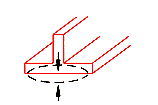Design
Working from the designer's
drawing, Amerex will make the shape as near as possible
to the design drawing. However, a full knowledge of the
shape's end use may enable Amerex to make preliminary
design suggestions. |
|
Tolerances
Standard extruded tolerances
should be used in eliminating extra cost or delay in production. |
|
Camber
or Bow Tolerances
Camber or bow tolerance
is based on the greatest deviation of a side from a straight
line. Acceptable camber or bow tolerance is .025 inches
in any foot. |
 |
|
|
Twist
Tolerances
The amount of
spiraling in an extruded shape is called twist. It can
be measured by the height of the high corner from a
flat reference base. The twist tolerance must not exceed
established rise x number of feet in length.
|
Section
Width
1/2
inch to 1-1/2 inches
Over 1-1/2 inch to 4 inches
Over 4 inches
|
Rise
Per Foot
.025
inch
.038 inch
.050 inch |
|
 |
|
|
Angular
Tolerances
Tolerances
on angles will not exceed plus or minus 2 degrees
|
 |
|
|
Transverse
Flatness Tolerances
The
transverse flatness tolerance is the maximum deviation
from a reference base across any cross section flat
surface. Allowable deviation from flat is.010"
per inch of width. Minimum deviation dimensions of
less than 1 inch is .010"
|
 |
|
Material
In some instances, customers
ask for a material grade which is either unavailable or has
a long purchase lead time. There may be alternate materials
available which meet the customer's design criteria, which we
would be prepared to investigate upon request. |

